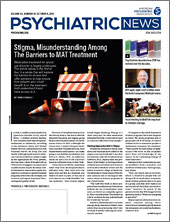News media coverage of medication treatment for opioid use disorder (OUD) is increasing, but there is room for improvement in its accuracy, a study in Health Affairs suggests.
Researchers at the Johns Hopkins Bloomberg School of Public Health looked at news stories about medication treatment for OUD in national media outlets such as the New York Times, Wall Street Journal, Washington Post, and USA Today; television news programs on major networks such as ABC, CBS, and NBC; television news shows with high viewership such as CNN’s “Situation Room,” Fox News Channel’s “Special Report,” and the PBS “NewsHour”; and two local newspapers in each of nine states hit hard by the opioid crisis. The researchers found that 45% of 300 news stories included at least one accurate message about medication treatment (for example, medication treatment can help people function), but 16% of news stories included at least one inaccurate message about medication treatment (for example, people on medication treatment are high). Furthermore, 9% of news stories contained the inaccurate message that medication treatment is akin to replacing one addiction for another.
National news outlets tended to fare better than local ones: 67% of their news stories mentioned at least one positive consequence of medication treatment such as reduced harms to health, compared with 46% of local news stories. Similarly, 36% of national news stories mentioned at least one negative consequence of medication treatment such as misuse of the medications, compared with 51% of local news stories. But perhaps most notable is that only 36% of all news stories noted that medication treatment is underused or that people faced barriers to accessing it. “There’s a real disconnect between what the public health and addiction communities know about treating OUD and the information news consumers receive. Misinformation can reduce investment in the infrastructure for delivering medication treatment and reduce interest in medication treatment among people who might benefit, which can be incredibly damaging,” said lead author Alene Kennedy-Hendricks, Ph.D., an assistant scientist in the Department of Health Policy and Management.
“I was recently at a community meeting where a parent who had lost her child spoke about her daughter wanting treatment but not medication because she didn’t consider it real recovery,” Kennedy-Hendricks added. “That individuals who are rebuilding relationships, have a job, or are fulfilling other roles in society that are meaningful to them would be told that they are not truly in recovery because they are treated with medication is really harmful.”
Kennedy-Hendricks added that inaccurate messages can contribute to stigma with respect to medication treatment, leading to “not-in-my-backyard” attitudes toward establishing treatment centers in the community. This can, in turn, siphon support away from policies that would increase access to the medications.
“We’ve seen letters to the editor stating that [local residents] didn’t want methadone or buprenorphine treatment providers in their community,” she said.
Psychiatrists can help counter misinformation in the media, particularly at the local level. “Few local newspapers are able to devote a reporter to a particular health beat. Psychiatrists can educate local news media [by discussing] the science of medication treatment and by sharing stories of people whose recovery from opioid use disorder has involved medication,” she said.
The researchers received no outside funding for this study. ■
“News Media Reporting on Medication Treatment for Opioid Use Disorder Amid the Opioid Epidemic” is posted
here. APA’s media guidelines are posted
here.


